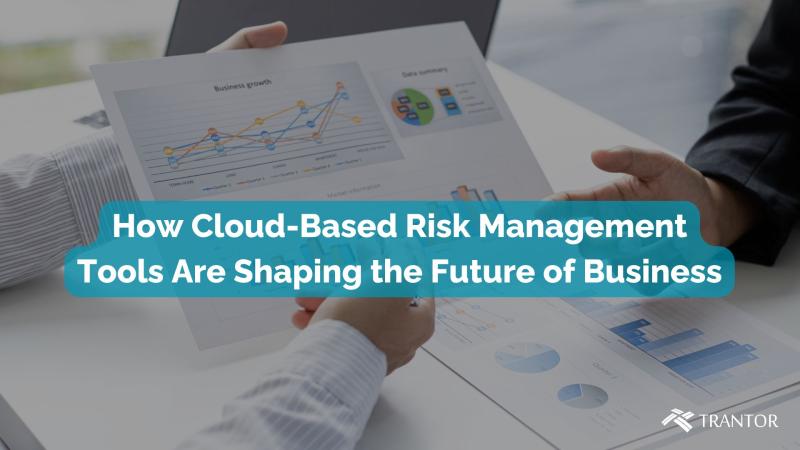How Cloud-Based Risk Management Tools Are Shaping the Future of Business

In today’s fast-paced and interconnected business landscape, managing risk has become increasingly complex. Businesses face a multitude of challenges, from cyber threats and data breaches to regulatory compliance and operational risks. To navigate these challenges, companies are turning to cloud-based risk management tools that provide real-time data, seamless integration, and scalable solutions.
Cloud-based risk management solutions are proving to be a game-changer for businesses by enhancing their ability to identify, assess, and mitigate risks more efficiently and cost-effectively. In this blog, we will explore how these tools are shaping the future of business, the key benefits they offer, and how companies like Trantor are enabling organizations to implement cutting-edge Risk Management Solutions for sustained success.
The Growing Importance of Risk Management
Risk management has always been a critical function for businesses. However, the nature of risk has evolved dramatically over the last decade. With the rise of digital transformation, globalization, and increasingly stringent regulatory requirements, companies are exposed to a wider array of risks than ever before. The COVID-19 pandemic further highlighted the need for agile risk management practices, as businesses had to rapidly adapt to new operational challenges and market conditions.
Today’s risks come in various forms:
- Cybersecurity threats such as ransomware and data breaches.
- Regulatory compliance pressures across industries.
- Financial risks due to fluctuating markets and economic instability.
- Operational risks from supply chain disruptions and workforce challenges.
- Reputation risks stemming from negative publicity, data leaks, or legal actions.
Given this wide spectrum of risks, businesses require a more robust and dynamic approach to risk management. Cloud-based solutions provide the necessary tools to address these diverse threats in real-time and help organizations stay ahead of potential crises.
What Are Cloud-Based Risk Management Tools?
Cloud-based risk management tools are software platforms that operate on cloud infrastructure, allowing businesses to manage risks without the need for on-premises hardware or software installations. These tools use real-time data, analytics, and automation to help organizations assess risks, prioritize responses, and streamline mitigation efforts.
Some common functionalities of cloud-based risk management solutions include:
- Risk identification and assessment through automated processes.
- Monitoring and reporting using dashboards and real-time alerts.
- Compliance management to ensure adherence to industry regulations.
- Incident management for dealing with crises and disruptions.
- Data protection and security using cloud-based encryption and threat detection.
By leveraging the power of the cloud, these platforms provide businesses with the agility, scalability, and accessibility they need to respond to risks more effectively.
Key Benefits of Cloud-Based Risk Management Solutions
Cloud-based risk management tools are becoming the preferred choice for businesses across industries due to their numerous advantages over traditional risk management approaches. Below are some of the key benefits that make cloud-based solutions essential for modern businesses.
1. Real-Time Data and Analytics
In the fast-moving digital world, businesses can no longer afford to rely on static, outdated data to manage risks. Cloud-based risk management platforms provide real-time access to risk data, empowering businesses to make faster and more informed decisions. Advanced analytics and machine learning algorithms enable companies to predict potential risks and identify trends before they escalate into major issues.
For example, financial institutions can monitor market conditions and adjust their portfolios to minimize exposure to volatility. Similarly, supply chain managers can track shipments in real-time and mitigate risks associated with delays or disruptions.
2. Scalability and Flexibility
One of the most significant advantages of cloud-based risk management tools is their scalability. As a business grows or changes, its risk profile evolves, requiring more sophisticated and expansive risk management processes. Cloud-based solutions are designed to scale seamlessly with the organization, accommodating additional users, increased data volume, and more complex risks.
This scalability ensures that businesses are always equipped with the right tools to handle their specific risk management needs, whether they’re a small startup or a multinational corporation.
3. Cost-Effectiveness
Traditional risk management solutions often require substantial upfront investments in infrastructure, software, and maintenance. In contrast, cloud-based platforms operate on a subscription-based model, allowing businesses to pay for only the services they need. This model reduces capital expenditure, making risk management solutions accessible to businesses of all sizes.
Moreover, cloud solutions eliminate the need for costly upgrades and maintenance, as the software is updated automatically by the service provider, further reducing operational costs.
4. Enhanced Collaboration and Accessibility
One of the biggest challenges in traditional risk management is the lack of collaboration between departments. Cloud-based tools foster collaboration by providing a central platform where different teams (such as compliance, finance, IT, and operations) can access shared data, reports, and risk assessments. This improved collaboration leads to a more holistic view of the company’s risk landscape.
Additionally, cloud-based platforms can be accessed from anywhere, allowing teams to work remotely or across multiple locations without compromising the effectiveness of risk management processes. This accessibility is particularly beneficial for global businesses with distributed teams.
5. Improved Security and Compliance
Contrary to common misconceptions, cloud-based risk management platforms often provide better security than traditional on-premises systems. These solutions are hosted on highly secure cloud infrastructures that comply with industry standards and regulations. Cloud providers also offer robust data encryption, access controls, and threat detection systems that help protect sensitive information from cyber threats.
For businesses in heavily regulated industries such as finance and healthcare, cloud-based platforms can help streamline compliance management by ensuring that policies, procedures, and reports are always up-to-date with the latest regulatory requirements.
Real-World Applications of Cloud-Based Risk Management Solutions
Cloud-based risk management tools are already making a significant impact in various industries. Below are a few examples of how these platforms are being used in real-world scenarios:
1. Financial Services
The financial sector is one of the most heavily regulated industries, and companies must constantly monitor risks related to market volatility, regulatory changes, and cybersecurity threats. Cloud-based risk management platforms help financial institutions manage these risks by providing real-time analytics, automated reporting, and compliance management features. For example, banks can use predictive analytics to assess the likelihood of loan defaults and adjust lending policies accordingly.
2. Healthcare
In healthcare, protecting patient data and ensuring compliance with regulations like HIPAA are top priorities. Cloud-based solutions help healthcare providers monitor risks associated with data breaches, operational failures, and regulatory compliance. By automating the reporting process and integrating with other healthcare systems, these platforms reduce the administrative burden and improve overall risk management.
3. Manufacturing
Manufacturers face numerous operational risks, from supply chain disruptions to equipment failures. Cloud-based risk management tools enable manufacturers to monitor production processes in real-time and detect potential risks before they affect operations. These platforms can also provide insights into maintenance schedules, helping to prevent costly equipment breakdowns.
4. Retail
Retail businesses are increasingly adopting cloud-based risk management solutions to address risks related to customer data breaches, inventory management, and compliance with consumer protection laws. By using cloud-based platforms, retailers can protect their customers’ personal information while ensuring that their operations comply with industry regulations.
The Role of Trantor in Cloud-Based Risk Management
As businesses continue to adopt cloud-based risk management solutions, they need trusted partners to help them implement and optimize these platforms. This is where companies like Trantor come into play. Trantor specializes in providing cutting-edge Risk Management Solutions that help businesses mitigate risks, ensure compliance, and enhance operational efficiency.
Trantor’s expertise in cloud technology, data analytics, and cybersecurity enables them to design and implement customized risk management strategies that align with the unique needs of each business. By leveraging Trantor’s solutions, companies can stay ahead of emerging risks and ensure long-term success in an increasingly unpredictable environment.
The Future of Cloud-Based Risk Management
As technology continues to evolve, the future of risk management will be increasingly driven by cloud-based solutions. Artificial intelligence (AI) and machine learning (ML) will play a more significant role in predicting and mitigating risks, while blockchain technology could enhance data security and transparency. Moreover, cloud-based platforms will become more integrated with other business systems, providing a holistic approach to risk management.
Businesses that adopt these advanced risk management solutions will be better equipped to navigate the challenges of the digital age and ensure resilience in the face of unforeseen crises.
Conclusion
Cloud-based risk management tools are shaping the future of business by providing real-time insights, enhanced collaboration, and scalable solutions for managing a wide range of risks. As the business landscape continues to evolve, these tools will play an increasingly important role in helping organizations stay agile, compliant, and secure.
By partnering with companies like Trantor, businesses can implement tailored Risk Management Solutions that not only mitigate risks but also drive growth and innovation. Cloud-based risk management is no longer just a trend—it’s a necessity for businesses looking to thrive in today’s complex and ever-changing environment.










Comments